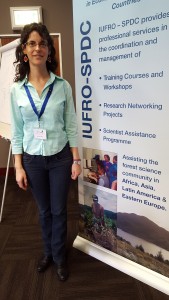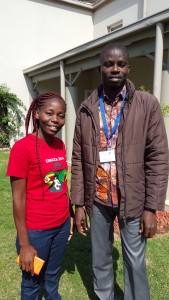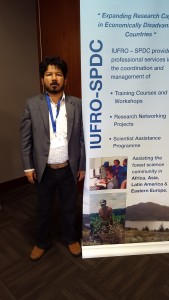Interview with four participants of the IUFRO-SPDC/WRI training workshop on science-policy interactions for forest and landscape restoration on 4-6 September 2015 in Durban, South Africa, prior to the World Forestry Congress: http://www.iufro.org/science/special/spdc/actproj/twdurban/
Mercedes Sá is a Forestry Engineer from Argentina. She works for the national government in the Directorate of Forestry. She is not a traditional scientific researcher because her every day work is related with the supervision of conservation and management plans of native forestry resources, including restoration activities, that all the provinces of Argentina approve for the compensation of environmental services under the framework of a National Law.
How did you learn about this workshop?
I read a tweet from the Iberoamerican Model Forest Network informing about this course.
Is this the first time for you that you take part in an IUFRO event?
No, as my employer, the Directorate of Forestry is a member of IUFRO, I had the opportunity to participate also in the IUFRO Regional Congress for Latin American in San José, Costa Rica, and the 2014 IUFRO World Congress in Salt Lake City, USA.
Why did you want to participate in this workshop?
I find the workshop topic highly interesting. In my previous job I gained experience with landscape restoration work and for my current job it is also important for me to be up-to-date in this area. Forest degradation and landscape degradation related to agriculture, for example, are an issue in Argentina.
What do you hope to gain from this workshop?
I want to learn about new tools and activities that can be included in the forest management and conservation plans in Argentina. As the Directorate of Forestry is evaluating these plans, this knowledge will be very useful especially when it comes to capacity building.
Would you recommend this workshop to your colleagues?
Yes, I like the way the topic is being presented and, as I work for a policy maker many of the issues that are being addressed in the context of science/policy interaction are familiar to me and important for my work.
Maggie Munthali from Malawi is currently working for the Department of Forestry in the Ministry of Natural Resources, Energy and Mines as an Assistant Regional Forestry Officer. She is responsible for managing, coordinating, monitoring, evaluating and implementing all forestry programmes and projects in the Central Region of Malawi. She will start her PhD at the University of Pretoria in January 2016
How did you learn about this workshop?
I found the announcement on the IUFRO Facebook.
Is this the first time for you that you take part in an IUFRO event?
Yes, and when I read the course announcement it was actually the first time that I heard about IUFRO. After that I went to the website and I applied for membership as an Associate Member. The World Forestry Congress now is also the first big event that I am attending. So this is really exciting.
What is the main reason why you wanted to participate?
I am responsible for all forest reserves and plantations in the central region of Malawi. Most forest reserves, however, are degraded and need to be restored. I would like to learn more about this topic and hear how other countries are managing landscape restoration. And I am here to network.
Why is landscape restoration important in your country/region?
Let me give you an example: There is a forest reserve in Central Malawi, which has some rivers that feed into a dam, and this dam provides water to all the people in the region and city of Lilongwe. Without forest restoration the water supply would be jeopardized and this could have grave consequences within a few years
What have you gained from this workshop?
I have learned about experiences with community management in other countries, e.g. in Latin America and also Nepal, as a way of restoring landscapes. I find it valuable to interact with people from different backgrounds and hope to continue collaboration with them.
I also realized the need to have a communication specialist, because often results are not well communicated especially to the stakeholder groups such as farmers or policy makers.
Will you be able to use this knowledge in your work?
Definitely, when I come back I will inform my employer about what I have learned here and, I will recommend an affiliation with IUFRO. I will also suggest to the Lilongwe University of Agriculture and Natural Resources to become a member.
Would you recommend this workshop to your colleagues?
Yes, certainly.
Badabate Diwediga is from Togo and is currently a PhD candidate in Climate Change and Land Use at Kwame Nkrumah University of Science and Technology (KNUST, Ghana). He is interested in the use of GIS, remote sensing, and field measurements to assess the historical land degradation and fragmentation in rural areas of Central Togo.
How did you learn about this workshop?
I read about it on the IUFRO website and on IUFRO’s Facebook.
Is this the first time for you that you take part in an IUFRO event?
Yes, it is.
What is the main reason why you wanted to participate?
This workshop really aligns well with my research objectives. I am sure it will help me enhance my level of comprehension, skills, and knowledge on landscape restoration
Why is landscape restoration important in your country/region?
Togo has one of the highest rates of deforestation in West Africa, even in Africa. Forests are used to support the livelihoods of the people. It will be important to come up with tools to restore the degraded forest landscapes as this will really help people through maintaining forest ecosystem services.
What do you hope to gain from this workshop?
As a young scholar, I am glad to attend this IUFRO-SPDC training workshop and hope to learn more in order to strengthen my skills and contribute to the promotion of adapted land use.
I am interested to learn from experiences and success stories from other areas of the world, and be part of an international network working on forest management and landscape restoration. This will also help me in my career.
Will you be able to use this knowledge in your research / in a particular project?
Yes, I can use this in my thesis, especially when it comes to policy recommendations as this is an important part of my thesis. The course helps me to understand some concepts that were not so clear to me before.
Would you recommend this workshop to your colleagues?
Yes, I would, and it would be great if such workshops could be expanded to increase participation and, thus, enhance cooperation.
Nirmal Kumar BK works for Forest Action in Nepal and is doing a PhD in Kathmandu University. In addition, he is a researcher in a landscape level community forest based climate change adaptation project in Nepal assessing the vulnerability and adaptation of six community forestry user groups. Apart from social networking, this project comprises forest restoration and river stabilization work.
How did you learn about this workshop?
I know IUFRO because I regularly read IUFRO publications. I found the announcement on the IUFRO website.
Is this the first time for you that you take part in an IUFRO event?
Yes.
What is the main reason why you wanted to participate?
Of course, I am interested in the topic because I am involved in forest and landscape restoration work in Nepal. In my work I often encounter difficulties and I hope that through this workshop I can get the competencies to overcome such difficulties.
What do you hope to gain from this workshop?
Landscape is not only geography, is has social dimensions and institutional dimensions as well. So I expect from the workshop that it will enhance my competencies related to how to integrate community level forest management into landscape level management with a view to local practices, institutional mechanisms and policy barriers. In addition, I also would like to share experiences that I gained during the work of this project and contribute additional knowledge and skills to the participants of that workshop.
Will you be able to use this knowledge in your research / in a particular project?
Yes, definitely. I hope to be able to apply the knowledge for local adaptation strategies, science/policy interaction and knowledge transfer and sustainable forest management in general.
Would you recommend this workshop to your colleagues?
Yes, I would.




Posted by Learning how others deal with forest, landscape restoration and applying new knowledge at home | The #Forests2015 Blog on
[…] Read more on the IUFRO blog […]